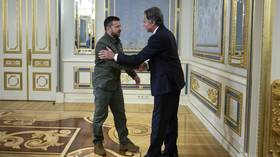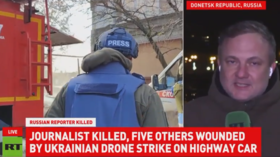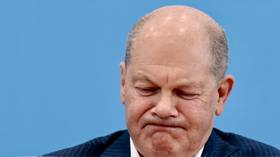Can Russia slay the dragon of corruption?

The Coat of Arms of Moscow depicts St. George astride a horse slaying a dragon, which today could be interpreted as the monster of corruption breathing down Russia’s neck at every turn.
Fighting corruption in every branch of society and government was announced as the primary goal of Dmitry Medvedev, who signed into force anti-corruption legislation shortly after being sworn in as the Russian President. Although progress is being reported on many fronts, there are daily reminders that the beast of burden will not be defeated any time soon.
The latest manifestation of the national curse came from an unlikely source: an officer from the southern city of Novorossiysk publicly beseeched government officials to address the problem of corruption, which he claims is rampant in his local department.
“I am tired of being made to uncover crimes that do not exist,” Alexey Dymovsky, a police officer, announced before a video camera. “I am tired of being told that these are the people who need to go to jail.”
The officer said that many individuals joined the force despite starting salaries of $400 because they knew they would be able to supplement their income with bribes. Dymovsky then requested a tête-à-tête with Russian Prime Minister Vladimir Putin to discuss the problems.
In Russia, it is common practice for traffic violations, for example, and other infractions of the law to be settled on the spot by a police officer, as opposed to the violator’s personal record being stained by a police report, or his or her afternoon consumed by a court appearance. Although many say they don’t mind paying a fine immediately if they know they are guilty, others disagree with the practice.
Electronic appliance salesman Anton, who requested his last name not be used, says he likes to drive fast and always keeps 500 roubles (about $17 dollars) in his glove compartment “just in case.”
“I live in the suburbs of southern Moscow, far away from my job, and I frequently get stopped by GAI [the abbreviation for the Moscow traffic police] for driving too fast,” he says. “If I know I am wrong I prefer just to pay the fine immediately and be done with it.”
Anton then relayed the story of a Russian friend, now living in the United States, who lost his driver’s license from getting too many police tickets.
“My friend called me and said he lost his license because he accumulated too many tickets,” Anton said. “He said there is no way to pay a bribe on the spot, because US police officers already make enough money.”
Dymovsky’s video became an overnight sensation on YouTube, with an estimated 700,000 hits, and elicited a mixed bag of responses from across the country.
“Alexey Dymovsky has said what almost all employees of the police force in Russia think,” Mikhail Pashkin, the head of the Russian police officers union, told “Ekho Moskvy” radio station.
This point of view, however, was not shared by Dymovsky’s colleagues.
In an open letter to city officials, the Novorossiysk police force said they were “insulted to the depths of the soul” by Dymovsky’s claims.
Vladimir Grebenyuk, the chief of the police force, told Ekho Moskvy that Dymovsky provided “no confirmation of the claims that he has made.”
Dymovsky, who said in his video that he had been an officer for 10 years, was fired from his job and is due to be charged with libel.
It would be easier to dismiss Dymovsky’s video complaint as the work of an individual who is simply not cut out for police work – albeit for one recent tragedy: in August, a lone gunman went on a shooting spree inside a Moscow supermarket, killing three and injuring seven in an unprovoked act of violence.
In a country where mass shootings are practically unheard of, the rampage naturally grabbed headlines both home and abroad, and even more so when it was revealed that the shooter, Denis V. Yevsyukov, was a Major in the Russian police force.
Russia’s Interior Minister addressed police chiefs on Tuesday, November 10, which is annual Police Day, and reminded them of their duty to protect “peaceful civilians.”
“We will not cover up for anybody,” Nurgaliyev began. “This also refers to those who have turned service in law enforcement agencies into a criminal business.”
“Such people have no place in our ranks,” he said.
Fighting corruption on a different front
As in other parts of the world, corruption is not just a problem exclusive to law enforcement agencies.
Last month, RT caught up with Dr. Wilfried R. Vanhonacker, the Dean of Skolkovo Business School in Moscow, to give his take on corruption, as well as how his school addresses the problem to students.
Dr. Vanhonacker quickly stressed that corruption is a problem everywhere, not just in Russia.
“The fact is, [corruption] is part of reality,” he said. “It’s everywhere in the world.”
Dr. Vanhonacker then compared corruption in the United States with corruption in Russia, saying that in many cases the term “corruption” is not applied when it should be.
“We don’t always use the word ‘corruption’, but just look at the recent insider trading scam, for example, that [hedge fund firm] Galleon was charged with [insider trading on Wall Street] in New York,” Vanhonacker said.
Asked what business schools should be doing to address the problem of corruption, Dr. Vanhonacker said that many institutions have “lost touch with reality.”
“The generation of kids that has attended business school in the last five-to-ten years was mostly middle-class, privileged kids,” he said. “So they never really had it hard, and then they go to business school and are being prepared to become a CEO or something.”
Vanhonacker then told the story of first-year MBA student who got invited to fly on a private jet to visit a US company.
“A few years ago, I was sitting in my office in Hong Kong and one of my MBA students came in and says: Guess what?”
So I said, “I don’t know, what happened?”
“Well, as it turned out, she had been working on a case for Enron, and this had been before the company went belly up [Enron was the American energy company headquartered in Houston, Texas that went bankrupt in 2001 in a sensational fraud case].”
“Now, this is a first-year MBA student, and she says, ‘I’m going to meet with Jeffrey Skilling [former president of Enron who was arrested for his role in the corruption scandal that led to the downfall of Enron] and Kenneth Lay [former CEO who died while skiing in Colorado in June 2006].”
“And I said: Good for you.”
“And then she told me that they’re going to send a private jet from Houston to Hong Kong to meet with the CEO.”
“She was very excited,” Vanhonacker said.
The Dean of Skolkovo regretted that for too many business school students, their world has become distorted and this can naturally lead to corruption.
“All of a sudden,” he said, “that’s what this world is all about. And now we are surprised that there is greed, and that there is funny behavior. They’ve lost their grounding.
“You talk to these kids about corruption, but how can they relate to that? You can’t even talk about it.”
In addressing the universal problem of corruption, Vonhacker said it is the duty of business schools to “make students aware of the reality, make them aware of the situations, because they are going to face those decisions.”
“There was corruption in Tsarist times”
On Saturday, President Medvedev gave an interview with Der Spiegel magazine where he spoke about the past, present and future of corruption and how Russia will work to defeat it.
“Corruption exists in any country,” the Russian president began. “But in our country it has assumed particularly ugly forms. There was corruption in tsarist times and Soviet times, even though it was more latent for well-known reasons.”
Medvedev then spoke about the challenges of moving from one economic system to another, as Russia did in 1991 with the collapse of the Soviet Union and communism.
“Corruption began to thrive after Russia’s transition to the current economic and political systems,” he said. “A freer society has its pluses and minuses. The pluses are obvious. The minuses are the greater number of government officials who can control cash flows, take bribes and try to get into business.”
Medvedev then acknowledged that Russia has never had anti-corruption legislation before, while also acknowledging that the newly instituted mechanisms “are beginning to work.”
“Russia has never had anti-corruption legislation in its entire 1,000-year history,” the president said. “But we have introduced it, and we have created mechanisms that are beginning to work.”
Medvedev then mentioned the “special presidential councils and special commissions for conflicts of interest” that his administration created to fight the dragon of corruption.
“I suggested that all our officials should declare their own incomes and the incomes of their families,” the Russian leader said, describing one small part of the extensive program.
“They did, even though they were not particularly happy about it.”













